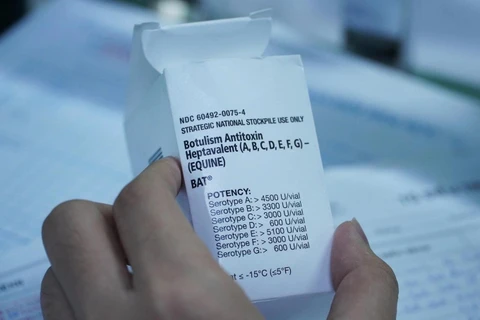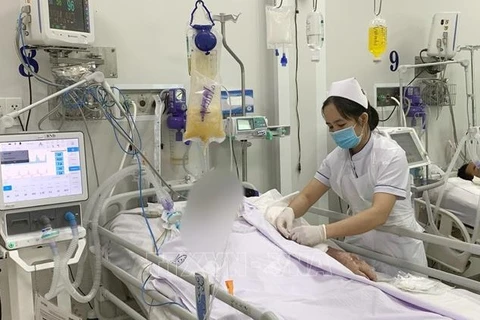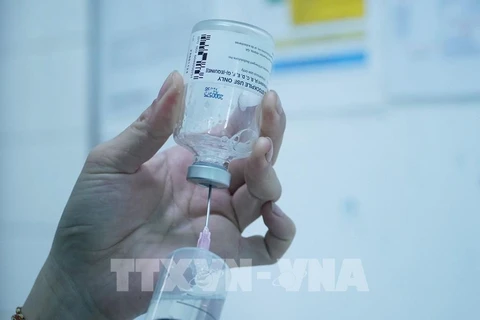Hanoi (VNA) - Never before have the cases of poisoning treated at detoxification centres across the country been so diverse, affecting people of all ages, including many unfortunate sufferers facing a lack of specific treatment drugs.
Recently, a series of botulism cases related to food poisoning has drawn significant attention from society, with 15 recorded in Quang Nam and Ho Chi Minh City in March and May this year.
Botulism is a rare but serious illness caused by a toxin produced by Clostridium botulinum bacteria that attacks the body’s nervous system. Symptoms of botulism usually start with weakness of the muscles that control the eyes, face, mouth, and throat. This weakness may spread to the neck, arms, torso, and legs. Botulism can also weaken the muscles involved in breathing, which can lead to difficulty breathing and even death.
Dr. Nguyen Trung Nguyen, head of the detoxification centre at the Bach Mai Hospital in Hanoi, stated that even in the US, where food safety standards are very high, about 150 cases of botulism take place annually. In Vietnam, since 2020, with adequate conditions and advanced clinical testing techniques, diagnosing and detecting cases in the community have become easier.
Nguyen estimated that Vietnam logs about 50 people infected with various types of botulism each year, including infant, wound, and foodborne botulism.
 Botulism Antitoxin Heptavalent drug is indicated for the treatment of symptomatic botulism. (Photo: VietnamPlus)
Botulism Antitoxin Heptavalent drug is indicated for the treatment of symptomatic botulism. (Photo: VietnamPlus) According to Dr. Nguyen Tri Thuc, Director of Cho Ray Hospital, BAT® (Botulism Antitoxin Heptavalent) – an equine-derived heptavalent botulinum antitoxin indicated for the treatment of symptomatic botulism in adult and pediatric patients – is an extremely rare drug not only in Vietnam but worldwide. Each vial of this medicine costs 8,000 USD and is not covered by the nation’s health insurance. Doctors involved in treating botulism patients all agree that without the availability of the medicine, the treatment is very difficult and the mortality rate is high.
The scarcity of the antidote is now the main hurdle facing botulism treatment in Vietnam.
 A patient is treated at the detoxification centre at the Bach Mai Hospital in Hanoi. (Photo: VietnamPlus)
A patient is treated at the detoxification centre at the Bach Mai Hospital in Hanoi. (Photo: VietnamPlus) Dr. Le Quoc Hung, head of the department of tropical pediatrics at the Cho Ray Hospital in Ho Chi Minh City, said running out of BAT is a regrettable issue for patients. Its prompt use within the first 48-72 hours gives them a chance to recover from paralysis and avoid having to rely on ventilators. Or, if they start mechanical ventilation for 1-2 days, it will take about 5-7 days for the patients to recover, be able to have their ventilators removed, and engage in physical therapy to return to normal life. Without the antidote, the patient's ventilator dependence can last from 3 to 6 months, leading to many dangerous complications.
According to the Drug Administration of Vietnam under the Ministry of Health, Botulism Antitoxin Heptavalent is a very rare drug. As there are only a few cases nationwide each year, hospitals often do not stock enough of it.
The shortage of the medicine is just one typical example of the long-standing issue of poisoning and drug shortages in the Southeast Asian country. Others that are often lacking include antivenom, detoxification drugs for arsenic and mercury poisoning.
Pham Khanh Phong Lan, a representative of the Ho Chi Minh City delegation to the National Assembly and the head of the municipal steering board for food safety management, recommended hospitals annually compile a list of rare drugs that need to be imported and submit it to the health bodies for approval to import. It is necessary to measure to meet the country's demand and purchase of an adequate quantity of drugs in advance to avoid shortages when incidents occur./.























